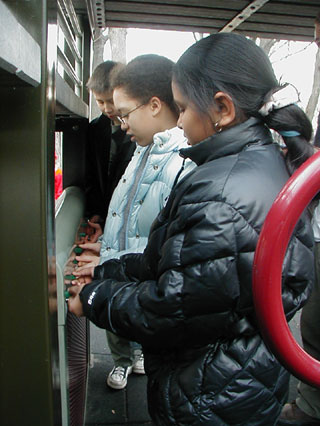
|
A Walk Through Harlem: Concept and Preparation introduction -- concept/preparation -- syllabus-- instruments --process/performance Most of us take the sounds of our voices and our environment for granted. I thought it would be interesting to use the computer as an instrument to help the kids discover the musical qualities of these sounds. But, while using the computer, I wanted to avoid having the kids look at the computer; rather I wanted to set up a situation where their ears were the primary connection to the computer, and, in a way, the computer as a physical object was irrelevant. I hoped for -- and got -- a situation where there could be a two-way learning street. The kids would learn about sound, music and technology, while I would, well, learn about sound, music and technology by seeing how they responded to and created with the technology. I began by building several software instruments that use commonly available but quite expressive hardware interfaces: the Wacom graphics tablets and the Tactex pad (a pad that senses multiple finger positions and pressures). I prepared several very rough programs, and tried to avoid "finalizing" them in any way so that I could see how the kids responded to them and I could work with them on further refining and developing them. Having done this, I was still terrified. I decided that I would be less terrified if I weren't alone, so I invited David Birchfield -- an extraordinary graduate student at Columbia -- to share my fear. This proved to be a crucial step, and David became equal collaborator in guiding the project with me. He developed several interfaces of his own, complementing some that I had built, and we were as ready for the kids as we could be.
introduction -- concept/preparation -- syllabus-- instruments --process/performance
|

